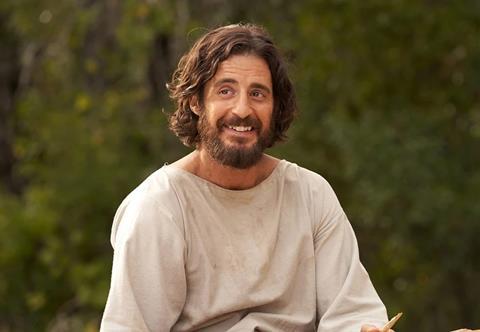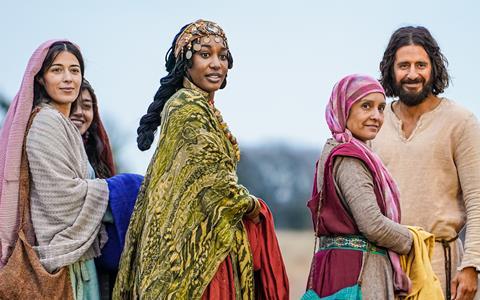As The Chosen wraps filming on season four and releases some sneak peek clips to fans worldwide, Madeleine Duxbury reflects on why it has connected so well with younger audiences – and what is has meant to her own faith journey

For various reasons, I’ve become wary of religion over the years (we’ll get to that later). But despite my hesitancy, I, like 400 million viewers worldwide, have found myself binge-watching The Chosen with a reverence previously only reserved for Fleabag, I May Destroy You and The Split.
It’s fair to say that the first ever multi-season show about Jesus is not what I was expecting from a programme based on the Bible (i.e. boring, preachy and irrelevant).
Totally unique in terms of funding, production and distribution, during its first three seasons, The Chosen has broken countless records (including outselling multiple Hollywood films at the box office when it premiered key episodes at cinemas). But perhaps most surprisingly, in an increasingly secular society, The Chosen is inspiring Millennials and Gen Z to view the Bible in a new light. And that includes me.
The Chosen has provided me with context in which to understand the role of women in the Bible
Its success with younger audiences has seemingly taken the team behind The Chosen by surprise, too. Katherine Warnock, one of the producers, explained in a CBN interview: “We didn’t expect it to perform so well with the Gen Z audience, and we haven’t really been able to crack the code as to why”. Keen to explore further, they invited nine young people who had never seen the show to binge watch season one together.
Reaching a new generation
Unfiltered: Gen Z Reacts to The Chosen is now a one-hour programme (also free to watch via the app). It begins with the show’s trailer being shown to the participants. Unsurprisingly, they expressed a hesitancy in watching a Bible-based show that I could really relate to.
“I think I’m always a little wary of Christian media,” says Josephine. Audrey adds that she generally regards it as “very preachy”. Emma is also nervous about the “force feeding” of religion. Although (and perhaps an early indicator as to why The Chosen is proving popular with younger women) Imani notes: “I’ve never seen Jesus look so cool – he looks kinda cute!”
Episode one centres around Mary Magdalene, and participants warmed to it. Imani commented: “I really liked how it felt relevant with the mental health issues…When everyone gave up on her, someone said: ‘I see you’”.
Episode two focuses on Nicodemus, a Jewish leader, and Emma is surprised she can relate: “To see a man of such a high level sit there and question himself and his faith – it’s so comforting…because if someone like that can question it, so can I.”
The third episode shows Jesus’s kindness towards children, and causes some participants to reflect on their difficult childhoods and negative experiences with religion. Imani tearfully recalls the abuse she experienced in church and how she wishes her mother “didn’t use religion to hurt so many people”.
As the group continue to #BingeJesus (a trademarked hashtag created by the show) it’s clear the characters and storylines are helping viewers to connect with the Bible.
Josephine empathised with Matthew’s struggle as an outcast: “The scene with his mother really hit home. I think growing up, I knew I was intelligent and talented, but [like a] classic Asian kid, felt like it wasn’t seen by my parents. And then realising I was queer, coming into another level of deep rejection.”
Emma took comfort in the portrayal of the woman at the well. “The fact that, like, Jesus is there and saying: ‘I came here for you’. I felt…she is a representation of everybody that’s sitting out there, like he is showing up for you. It was big, I really liked that.”
For Imani, the cast diversity made an impact. “I literally was losing my mind because I cannot tell you how many times I’ve wanted to see someone who looks like me in something as powerful as this. It just makes my heart so happy that people of colour can see themselves like this”.
The affection for the characters is clear (“Oh, I love Matthew so much!” squeals Emma at one point) while the rest of the group clap and cheer as he quits his day job as a tax collector and heads off to follow Jesus (the social media generation know better than anyone about the power of ‘a follow’).

Finding me
Personally, I particularly enjoyed the importance female characters are given within the show. One of the reasons I rejected my religious upbringing as a teenager was because it felt totally at odds with the modern, feminist world I was growing up in. I couldn’t reconcile championing girl power while being part of an organisation that was started, run (and ultimately controlled) by men.
Regardless of God’s gender (which I’d always assumed to be male), central to the Bible story is the fact that it was a guy (Jesus) who was sent to “save the world”. My thirteen-year-old self was outraged. My teenage self also failed to see how the Bible reflected the patriarchal society of the time rather than condoned it. And don’t get me started on all the sex stuff.
Imani notes: “I’ve never seen Jesus look so cool – he looks kinda cute!”
The Chosen has (among other things) provided me with more context in which to understand the role of women in the Bible.
As Elizabeth Tabish, who plays Mary Magdalene, explained: “Jesus elevated women, period. It’s rooted in what Jesus did, you know. His care, respect, and love for women was the same as men — it was for all people. I’m excited that we’re a show that is representing a vast array of women: mothers, wives, entrepreneurs, women with pain, women with joy. It’s just the gamut of female experience, and [the creators of The Chosen are] going in a really honest and sometimes raw and challenging direction with this, in a way that shows very specifically female traumas and pains.”
A fresh look
Countless TV producers and film directors have attempted to translate the world’s best-selling book to the screen. But where others have failed in being too gory (The Passion of Christ), not biblically accurate (Noah) or earnest-but-bland (Son of God), The Chosen seems to have found the sweet spot.
By developing relatable characters that viewers can connect with, and storylines that they find relevant, The Chosen has given a younger generation the opportunity to navigate life with advice from what otherwise might be considered a ‘dusty old book’.
And, as Tabish learned from playing Mary Magdalene, “In life, you’re going to make mistakes. The beautiful thing about that, though, is you’re always still loved, no matter what. And the further you go into accepting that, the less painful those lessons have to be.”
As for me, I’m looking forward to season four and the return of my weekly dose of (easy to digest) scripture. The Chosen gives me hope that, one day, the craziness of life will somehow all make sense.
Oh, and the casting of a “kinda cute” Jesus doesn’t hurt either.































No comments yet